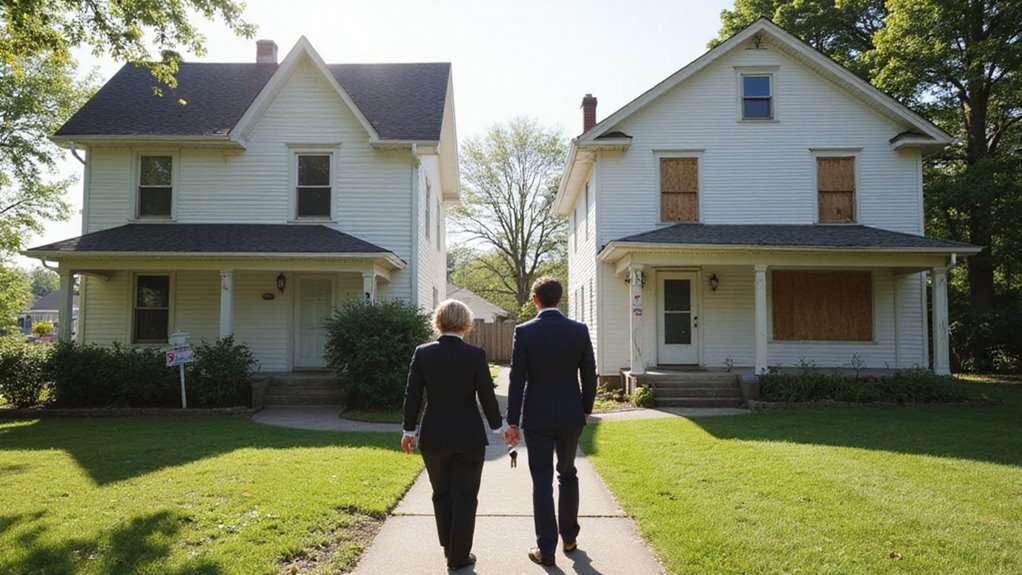Falling behind on your mortgage can be scary and confusing. You may be stuck choosing between a short sale or foreclosure. Each option has big impacts on your finances and credit.
The stress of late payments can quickly grow. If you do nothing, you could lose your home and face lasting credit damage. Choosing the wrong option might make it even harder to recover.
A short sale is often a better choice than foreclosure because it gives you more control and less long-term harm. Knowing the pros and cons can help you protect your future and make a smart decision. This blog will guide you through both options so you can find the best path forward.
Key Takeaways
- Short sales typically cause less credit score damage and allow quicker reentry into the housing market compared to foreclosures.
- A short sale gives homeowners more control and involvement, while foreclosure is a lender-driven, forced process with less flexibility.
- Both options impact taxes and may incur deficiency judgments; consulting a tax or legal advisor is crucial before proceeding.
- Emotional and psychological stress is often lower with a short sale, as the process is less abrupt and more collaborative.
- Acting early and communicating with your lender increases the chances of a favorable outcome, regardless of the chosen option.
Understanding Short Sales: How They Work

A short sale is when you sell your home for less than you owe on the mortgage. This option is often used if you cannot afford your payments. It may help you avoid foreclosure.
The process begins with a property valuation by your lender to find the current market value. If you want a short sale, you must explain your financial hardship to the lender. The lender must agree to accept the sale amount as payment in full. In some cases, the lender may also require a professional property appraisal to determine a fair selling price.
Good communication and clear paperwork are important at each step. If you complete a short sale, your credit may suffer less than with foreclosure. If you consider a short sale, be sure you understand all requirements and consequences. You can also benefit by working with cash home buyers who can provide quick, as-is sales and streamline the process.
The Foreclosure Process Explained
Foreclosure is a legal process that happens when you do not make your mortgage payments. The lender takes steps to reclaim your home. This process is often more serious than a short sale.
The process starts with a notice of default after you miss several payments. If you do not settle the debt, the home goes to a public auction. You lose control over the sale once the foreclosure process begins. Working with a company that offers guaranteed all-cash offers can help you sell quickly before the foreclosure process advances.
Lenders focus on recovering the amount you owe, not your home’s equity. The auction price depends on the property’s value at the time. If the sale does not cover your debt, you may still owe the remaining balance.
Foreclosure can damage your credit score for years. It may also make it hard to get loans in the future. If you want to avoid foreclosure, you should contact your lender early. Taking proactive steps like boosting curb appeal or maintaining your home’s condition can also help if you decide to sell before foreclosure begins.
Key Differences Between Short Sales and Foreclosure

A short sale and a foreclosure are two different ways to handle an unaffordable mortgage. In a short sale, the homeowner sells the house, usually with the lender’s permission. Foreclosure happens when the lender takes the home after missed payments. If you’re considering either option, knowing about closing costs and escrow funds can help you plan your finances during the transition.
Short sales let you stay involved in the process and plan your move. If you choose this option, you may feel less stress since you manage some details. Foreclosure, on the other hand, gives control to the lender and leads to a quicker, forced move.
If you want more say in the process, a short sale may work better for you. Foreclosure might happen if you cannot sell or work with your lender. Each option has emotional and financial effects, so consider your situation carefully.
For both short sales and foreclosures, it’s crucial to understand the legal and disclosure considerations that may affect the process and your responsibilities as a seller.
Impact on Your Credit Score
Short sales and foreclosures can both lower your credit score. A short sale may drop your score by 100 to 150 points. Foreclosure can lower it by 150 to 200 points or more.
Short sales show lenders you tried to repay your debt. This can help you recover your credit faster. If you complete a short sale, you may get loans sooner. Short sales may also attract specific buyers, such as investors or renovators, who are more willing to work with properties in any condition.
Foreclosure suggests higher financial trouble to lenders. If you go through foreclosure, it may be harder to borrow later. Recovery from foreclosure often takes longer than from a short sale.
If your home has foundation issues, these problems may further affect your options and how quickly you can recover financially.
Financial Consequences for Homeowners

A short sale and a foreclosure both settle mortgage debt, but they affect your finances in different ways. A short sale may allow you to negotiate debt forgiveness, which can reduce your future financial burden. If debt is forgiven, the IRS might count it as taxable income.
You could face a tax bill after a short sale, so check with a tax advisor. Foreclosure can leave you owing the lender for any unpaid balance, possibly leading to legal problems. Local governments might also reassess your property value and raise your property taxes after foreclosure. In addition, it’s important to understand capital gains tax implications and how they might impact your financial outcome when selling, especially in complex title situations.
Both short sales and foreclosures can hurt your ability to refinance soon. A short sale usually leaves you with less debt than a foreclosure. If you want a quicker financial recovery, a short sale is often easier to manage. Sellers in Staunton, VA may also benefit from guaranteed cash offer solutions that help avoid the long-term consequences of foreclosure.
How Each Option Affects Your Ability to Buy Again
When deciding between a short sale and foreclosure, you need to consider how each will affect your timeline for buying another home. Waiting periods and credit score drops aren’t the same for both options, and lenders weigh them differently. Understanding these distinctions gives you a clearer path to homeownership in the future.
Additionally, it’s important to factor in legal requirements and disclosure rules, as these can impact your eligibility and the process for purchasing your next property. Reviewing your lien history early can also reveal potential encumbrances that might affect your ability to move forward with a new purchase.
Waiting Periods to Rebuy
You can buy a new home after a short sale or foreclosure, but waiting periods apply. The length of the wait depends on your loan type and financial situation. Lenders set these timelines to assess your risk as a borrower.
A short sale usually lets you qualify for a conventional loan in two years if your finances stay stable. If you had a foreclosure, you might wait up to seven years for a conventional loan. Short sales generally allow for a quicker return to the market than foreclosures.
FHA and VA loans may let you buy again sooner than conventional loans. These loans offer shorter waiting periods for both short sales and foreclosures. If you want to buy quickly, a short sale and government-backed loans may help.
Knowing these waiting periods can help you plan your next home purchase. If you follow the right steps, you can return to homeownership sooner. Careful planning increases your chances of re-entering the market successfully.
Credit Score Impact
Your credit score drops after a short sale or foreclosure. Lenders use this score to decide if you can get another mortgage. If your score is low, you may not qualify for loans or may pay higher interest rates.
A short sale usually lowers your score by 50 to 150 points. A foreclosure can drop your score by 150 to 200 points or more. These drops make it harder to borrow money in the future.
Lenders may prefer a short sale over a foreclosure. If you get mortgage counseling or manage debts well, lenders may see you as less risky. Quick action to rebuild your credit can help you buy a home sooner.
Timeline Comparison: Short Sale Vs Foreclosure

Short sales and foreclosures both help homeowners who cannot pay their mortgage. However, their timelines are different and affect future finances in unique ways. A short sale is usually faster and gives the homeowner more control. Sellers who choose a short sale may benefit from fresh marketing efforts that can help attract buyers and move the process along more quickly.
Short sales often take about 3 to 6 months. The process depends on lender approval and local real estate conditions. If the lender responds quickly, the timeline may be shorter. Short sales typically take 3 to 6 months, but a quick lender response and local market conditions can shorten the process.
Foreclosures usually last between 6 and 12 months. The process follows strict legal steps and may take longer in some states. Court delays can also increase the wait.
After a short sale, homeowners may qualify for a new mortgage sooner. Foreclosure often leads to a longer wait before buying another home. If quick recovery is important, a short sale may be the better option.
Understanding local market conditions can also affect how quickly a property moves through a short sale or foreclosure process.
Emotional and Psychological Factors
Short sales and foreclosures can cause strong emotional stress for homeowners. Both situations often bring feelings of loss, worry, and shame. If people do not prepare, these emotions can become overwhelming.
A short sale lets you take part in the process. This may give you some control and help you feel less stressed. It can offer a sense of closure if you need to leave your home.
Foreclosure is often more sudden and public. This can increase feelings of anxiety and helplessness. If you face foreclosure, you may feel alone or embarrassed.
Anyone in these situations should recognize the emotional impact. If you seek support, you may cope better with the stress. Understanding the challenges can help you protect your mental well-being.
For some homeowners, considering a guaranteed all-cash offer can help reduce anxiety, as it provides a clear and straightforward way to avoid the uncertainties and emotional turmoil of foreclosure.
Effects on Your Tax Situation

A short sale or foreclosure can affect your taxes. The IRS may count forgiven debt as taxable income. You might owe taxes on the canceled debt.
If your lender forgives part of your mortgage in a short sale, you could pay more taxes that year. Foreclosure can also lead to taxable debt forgiveness. This can increase your tax bill unless you qualify for certain exemptions.
Some homeowners may avoid taxes if they meet special rules. The Mortgage Forgiveness Debt Relief Act sometimes helps, but not everyone qualifies. You should check with a tax professional to see if you are eligible.
The Role of Lenders in Each Scenario
The lender’s role is different in short sales and foreclosures. In a short sale, you must work with the lender. You show proof of your financial trouble and ask to sell for less than you owe.
The lender checks your documents and decides if the sale can happen. Your help is needed for the process to move forward. If you do not take part, a short sale will not be possible.
In foreclosure, the lender takes control if you stop paying your mortgage. The lender starts legal action to take back and sell your home. You have little say once the process starts.
Foreclosure is focused on helping the lender recover money, not on working out a deal. If you cannot pay, you may lose your home without further discussion. Your involvement is limited during foreclosure.
How to Qualify for a Short Sale
To qualify for a short sale, you’ll need to prove a genuine financial hardship that prevents you from keeping up with your mortgage. Your lender sets specific approval criteria, so you must meet their requirements before moving forward. Be prepared to submit detailed documentation, including financial statements and hardship letters, as part of the process.
Demonstrating Financial Hardship
To get a short sale, you must prove real financial hardship. Lenders need clear proof that you cannot pay your mortgage. If you cannot show this, they will not approve a short sale.
You should gather documents showing your income and expenses. These include pay stubs, tax returns, and a simple budget. These papers must show you do not have enough money to pay your bills.
You need to write a hardship letter. The letter should explain why you cannot pay, such as job loss, illness, or divorce. Be honest and give details about your situation.
If you tried other options, you should show proof. This could include letters showing you were denied refinancing or debt help. These records prove that you tried to solve the problem in other ways.
If you clearly present your case, the lender may approve a short sale. Being organized and honest will help your request.
Lender Approval Requirements
Lenders only approve a short sale if you meet strict rules. You must prove you have no better options. If you can fix things with a loan change or bankruptcy, lenders will not allow a short sale.
Lenders check your property’s value, your loan balance, and your finances. If you have enough income or assets, they may want you to try other solutions first. Lenders look for proof that a short sale is the best choice for them.
Here is how lenders usually compare your options:
| Criteria | Short Sale | Foreclosure |
|---|---|---|
| Loan Modifications | Must try first | Not always needed |
| Bankruptcy Options | Must consider | May happen later |
| Financial Review | Very detailed | Less strict |
You must meet all these conditions to get short sale approval.
Documentation and Paperwork Needed
A short sale application needs the right documents to get approved. Lenders require proof of hardship, financial status, and property value. If there is mortgage insurance, you must also get approval from the insurer.
A hardship letter explains why you cannot pay your mortgage. Financial records include pay stubs, tax returns, and bank statements. Property appraisal or a broker price opinion shows your home’s current market value.
If you provide these documents quickly, it will help your case. Solid paperwork builds trust with the lender. Good documentation can improve your chances of approval.
Alternatives to Short Sale and Foreclosure
There are several options besides short sale and foreclosure if you are struggling with your mortgage. Homeowners can try refinancing or ask the lender for a loan modification. These steps may lower your payments or interest rate.
If you want to leave your home, you could donate the property to a charity. Property donation removes your mortgage and helps a good cause. Another option is a deed in lieu of foreclosure, where you give your home back to the lender.
Each choice has its own benefits and drawbacks. People should look at their finances and talk to a professional before deciding. If you need help, always ask your lender or a housing counselor for advice.
Legal Implications You Should Know
When considering a short sale or foreclosure, you need to understand the serious impact each can have on your credit score and future borrowing ability. Both options may also expose you to deficiency judgments, where lenders pursue the remaining loan balance after the property sells. Knowing these legal consequences helps you weigh the true cost of each path.
Credit Score Consequences
Short sales and foreclosures both hurt your credit score, but the impact is different. A short sale usually causes less damage than a foreclosure. If you plan to refinance or borrow again, this difference matters.
A short sale may lower your score by 50–150 points. You might be able to get a new mortgage in as little as two years. This makes a short sale less harmful if you need credit soon.
Foreclosure can reduce your score by 200–300 points. Getting approved for new loans becomes much harder after a foreclosure. It can stay on your credit report for several years.
Both short sales and foreclosures may lower your property’s market value. If your home value drops, borrowing against it could be more difficult. These events can affect your financial plans in the future.
Deficiency Judgment Risks
A deficiency judgment is when a lender asks you to pay the difference if your home sells for less than you owe. This can happen after a foreclosure or short sale. State laws decide if lenders can collect this money.
If the home’s sale price is very low, you could owe more. An inaccurate property value may also cause trouble, like fraud accusations. Proper valuation helps avoid these risks.
Not all debt is forgiven in a short sale unless you have written proof. Foreclosure can still leave you owing money if the sale falls short. Always talk to a lawyer before making decisions.
Steps to Take When Facing Mortgage Hardship
If you are having trouble paying your mortgage, you should act quickly. Taking early steps can give you more options and help you avoid losing your home. Your chances of a good outcome are better if you do not wait.
Start by looking at your finances. List your income, expenses, and debts to see where you stand. This helps you understand what you can afford and what needs to change.
You should check possible solutions that fit your situation. Consider options like loan modification, forbearance, debt consolidation, or other types of financing. If you are unsure, you can ask a financial counselor for advice.
Contact your lender as soon as you can. Honest and early communication may help you find a way to keep your home. If you wait too long, your choices may become limited.
Conclusion
If you face the choice between a short sale and foreclosure, it is important to consider your long-term goals. If you want to protect your credit and reduce stress, a short sale may be the better choice. If you wait too long, foreclosure could make financial recovery harder.
If you need to sell quickly, we buy houses for cash in any condition. Align Real Estate Solutions can give you a fair cash offer and close on your timeline. If you work with us, you can avoid the uncertainty of traditional sales.
If you want to take control of your situation, contact us today. We at Align Real Estate Solutions are ready to guide you through your options. Let us help you move forward with confidence.
Author
-

Zach Koops is co-founder and Real Estate Success Manager at Align Real Estate Solutions, serving homeowners across Virginia since 2024. With a passion for real estate and a heart for people, Zach has built his career around helping sellers navigate tough situations—foreclosure, inheritance, relocation, repair-overload—with clarity and compassion. He’s known for being straightforward, steady under pressure, and deeply invested in relationships. Outside of work, he spends his time as a husband and father, enjoys the outdoors in Shenandoah Valley, loves singing on stage, and constantly seeks growth through reading and new experiences.









